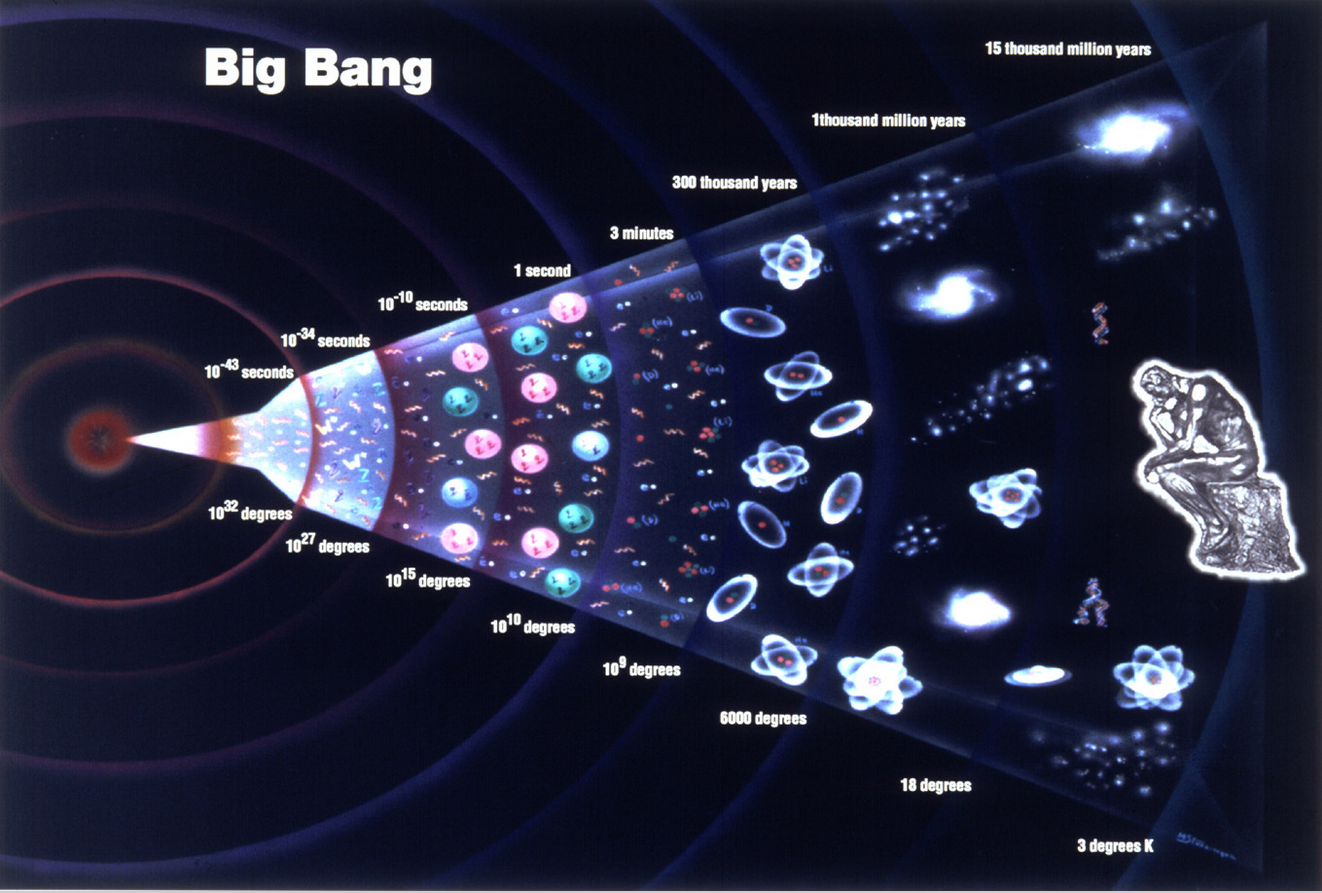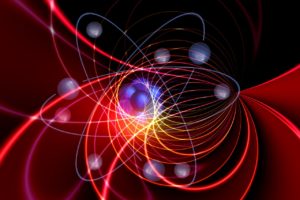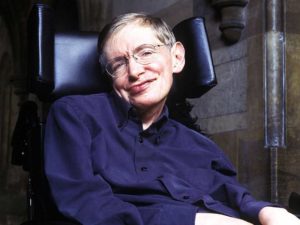More than once, I’ve given The Kalam Cosmological Argument in an online discussion with an atheist, and more than once, he’s rebutted me saying that The Big Bang is not really the origin of the entire universe, but just the origin of its expansion. Recently, in a Facebook post of mine that went viral, an atheist left this comment. Here’s what he said verbatim “You have not proved reality has a beginning. You have extrapolated the ‘apparent”’ expansion backwards. But you cannot assert the expansion was the beginning of everything, or that it is consistent. It also seems odd that you cling onto this scientific observation, but ignore what doesn’t suit.” Why is it that so many Christian Apologists use The Big Bang to prove the second premise of The Kalam Cosmological Argument, but several atheists deny that it is the beginning of the universe?
First, What Is The Big Bang?
The Big Bang theory states that the universe was in a hot dense state 14 billion years ago, and started expanding from that state. The first evidence of this was found in the early 1900s. In 1915, Albert Einstein formulated his General Theory of relativity. Einstein’s theory predicted a universe that was either in a constant state of expansion or contraction and Einstein was not comfortable with the implications of this theory, so Einstein added a cosmological constant to his equations (which many have called a “fudge factor”) to keep the universe walking on a tight rope, if you will, between expansion and contraction. The problem is that the kind of universe Einstein proposed was incredibly unstable. Even the haulage of matter from one part of the universe to the other would upset the balance and cause the universe to either start expanding or else contracting. Einstein later called his constant “the greatest blunder of [his] scientific career”. Einstein’s theory entailed that the universe was expanding.
Later, the Russian Mathematician Alexander Friedman, and the Belgian Astronomer George Lamatre, independently formulated theorems that also entailed an expanding universe. Then later, in 1929, the American Astronomer Edwin Hubble looked through his telescope and noticed something startling; the light from the red shifts in the galaxies appeared to be “redder” than they should have been. Hubble concluded that the redness of the light from the galaxies was because the galaxies were moving away from one another. And why were they moving away from one another? Because the universe was expanding. Now, for the first time, we had empirical evidence to back up the theoretical evidence of Einstein, Friedman, and Lamaitre. The scientific evidence shows that the universe is expanding.
This had startling theological implications. If the universe is getting bigger, and bigger, and bigger, as it gets older, and older, and older, then that must mean that it was smaller, and smaller, and smaller, in the past. If you were to watch the expansion of the universe on a video, as the film runs forward, the galaxies and stars move farther and farther out from one another, but if you were to rewind the film, the stars would get closer and closer together. If you keep rewinding the footage, the universe becomes as small as the period at the end of this sentence. Rewind the footage further still, and the universe shrinks down to nothingness. This at least seems to mark the beginning of the universe.
This can easily be seen from the picture depicting the cosmic expansion at the very top of this blog post. The farther ahead in time you go, the more the galaxies grow farther and farther apart. The conclusion that the universe had a beginning is arrived at by backward extrapolation. Mentally moving the universe’s expansion back in time causes the universe to shrink down to a point of infinite density, a point where the universe is smaller than the period at the end of this sentence. One need simply move the expansion even further back in time and it shrinks down to nothingness. This does seem to be the origin of the universe, of all matter, energy, space, and time!
What does atheist think the big bang is? Does he think that the universe existed from eternity past in an incredibly tiny state, and, for some reason just started expanding 14 billion years ago. If this is the case, then I must say that this seems like an incredibly ad-hoc response. There’s just simply no reason to think that we can’t extrapolate the expansion all the way back to an absolute beginning out of nothing. If the atheist wants to maintain this position, he’s going to have to give us good evidence that this is what occurred. Moreover, we have the mechanistic agent problem that I pointed out in my first blog post on The Kalam Cosmological Argument. If all matter, energy, space, and time existed in a tiny dot of a universe from eternity and all of a sudden began expanding a finite time ago, how do you explain why it didn’t start expanding sooner? If the necessary conditions were in place for the universe to start expanding, it should have always been expanding, and yet it hasn’t. Only a personal agent could be an eternally existing cause but only produce an effect a finite time ago.
What Do Scientists Say?
What do scientists say? Do scientists also agree with me and the Christian Apologists that the big bang is the origin of the universe? If this is the case, then maybe…just maybe…the big bang is in fact the origin of the universe. Please note that the list of quotes below consist of both believing and non-believing scientists.
“Tune your television to any channel it doesn’t receive and about 1 percent of the dancing static you see is accounted for by this ancient remnant of the Big Bang. The next time you complain that there is nothing on, remember that you can always watch the birth of the universe.”
― Bill Bryson, [A Short History of Nearly Everything]
“Together with Roger Penrose, I developed a new set of mathematical techniques, for dealing with this and similar problems. We showed that if General Relativity was correct, any reasonable model of the universe must start with a singularity. This would mean that science could predict that the universe must have had a beginning, but that it could not predict how the universe should begin: for that one would have to appeal to God.” – Stephen W. Hawking, [“Origin of the Universe” lecture]
“The conclusion of this lecture is that the universe has not existed forever. Rather, the universe, and time itself, had a beginning in the Big Bang, about 15 billion years ago.” — Stephen Hawking, [The Beginning of Time]
“It is said that an argument is what convinces reasonable men and a proof is what it takes to convince even an unreasonable man. With the proof now in place, cosmologists can no longer hide behind the possibility of a past-eternal universe. There is no escape; they have to face the problem of a cosmic beginning.” – Alexander Velinken, [Many Worlds In One]
What’s more is that several NON-Christian scientists have stated quite candidly the theological implications of The Big Bang theory, and how extremely similar the theory is to the biblical doctrine of creation out of nothing found in Bible passages like Genesis 1 and John 1. Why would they say things like this if The Big Bang theory really wasn’t the absolute beginning of matter, energy, space, and time? Just look at what these non-Christian scientists say!
“Astronomers now find they have painted themselves into a corner because they have proven, by their own methods, that the world began abruptly in an act of creation to which you can trace the seeds of every star, every planet, every living thing in this cosmos and on the earth. And they have found that all this happened as a product of forces they cannot hope to discover…. That there are what I or anyone would call supernatural forces at work is now, I think, a scientifically proven fact.” — –Astronomer, physicist and founder of NASA’s Goddard Institute of Space Studies; Robert Jastrow.
“Now we see how the astronomical evidence leads to a biblical view of the origin of the world. The details differ, but the essential elements in the astronomical and biblical accounts of Genesis are the same: the chain of events leading to man commenced suddenly and sharply at a definite moment of time, in a flash of light and energy.” – Astronomer, physicist and founder of NASA’s Goddard Institute of Space Studies; Robert Jastrow.
“The best data we have (concerning the Big Bang) are exactly what I would have predicted, had I nothing to go on but the five books of Moses, the Psalms, the Bible as a whole.” – Arno Penzias, [New York Times, March 12, 1978]
“Not only did the Big Bang model seem to give in to the Judeo-Christian idea of a beginning of the world, but it also seemed to have to call for an act of supernatural creation…” —J.M. Wersinger, Assoc. Professor of Physics, Auburn University
Pulitzer Prize winning columnist George Will put it best: “Soon the American Civil Liberties Union, or People for the American Way, or some similar faction of litigious secularism will file suit against NASA, charging that the Hubble Space Telescope unconstitutionally gives comfort to the religiously inclined.”
“There is no ground for supposing that matter and energy existed before [the Big Bang] and were suddenly galvanized into action. For what could distinguish that moment from all other moments in eternity? It is simpler to postulate creation ex nihilo—Divine will constituting nature from nothingness.” –English mathematical physicist Edmund T. Whittaker, winner of the Copley Medal, which is the most prestigious award in British science.
Again, why would they say things like this if The Big Bang Theory wasn’t the beginning of the universe? Why would they say things if “cannot assert the expansion was the beginning of everything” as the atheist on one of my threads asserted?
Perhaps They’re Still Clinging To Old Alternatives To The Big Bang
It’s possible that some atheists make this assertion because they’re still holding onto old alternatives for The Big Bang. When the scientific evidence for the big bang theory was mounting, atheist scientists were greatly disturbed. They realized the theological implications that the theory entailed (as the quotes above show). Therefore, they postulated a few alternatives to the standard big bang model which would allow them to avoid concluding that the universe sprang into being out of nothing a finite time ago.
The Cyclical Model
One model championed by scientists was the cyclical model of the universe. This theory stated that the universe was going through an eternal cycle of expansions and contractions. The universe would expand from a tiny, dense point for billions and billions of years but would eventually recontract into the tiny dot that it expanded from on the previous go round. This cycle of expansion and retraction, according to these theories, has been going on from eternity past and will continue to occur in eternity future. This theory, if true, would entail that the universe never began to exist, but is eternal.
This theory is no longer held by hardly any astronomers or physicists. This is because this theory is plagued with several problems. The first problem is that even if the universe will someday contract, no one knows of a potential “bounce” mechanism which would cause the universe to undergo another expansion. Secondly, the universe currently isn’t dense enough for gravity to cause a retraction of the universe. Thirdly, even if the universe did have a mechanism which would cause the universe to bounce back from a retraction, and even if the universe were dense enough for gravity to pull the universe back to a singularity, the amount of energy in the universe would not be replenished. What that means is that whatever amount of useable energy the universe contained on one round of expansion, it would have that exact same amount of energy in the next round of expansion. What this entails is that the energy required to cause the bounce mechanism to start new expansions after each contraction would run out eventually. And thus, eventually, there would come a time when the universe contracts but could never cause another expansion. This means that there can only be a finite number of big bangs. It would mean there would have to be a final big bang. But if you have a final big bang, you had to have a first big bang. Hence, the universe is not eternal. As an illustration, think of what happens when you drop a rubber ball. The rubber ball has enough energy for it to bounce back several times, but it loses that energy each time it makes contact with the ground. After several bounces, it comes to a complete halt! That’s a good analogy of what the universe would do on the cyclical model. Given that the bounce mechanism of the universe would use up more energy after each cycle, the size of the expansions would get smaller and smaller and smaller after each bounce.
Fourth problem; the infinite regress problem. The fourth problem is not so much scientific as it is philosophical. What the cyclical model proposed is just simply impossible! You cannot have actually infinite number of past events. Why? Because the present event would never arrive if we had to endure through an actually infinite number of past events. On the cyclical model, before this expansion round could occur, the round before it had to occur, but before that round could occur, the round before it had to occur, and before that round could occur, the round before it had to occur, and before that round could occur, the round before it had to occur, and so on back to infinity! No expansion could ever take place because there would always be an infinite number of expansion cycles which would have to take place first. But then, how could this cycle be occurring right now? The most reasonable explanation is that there either is no continuous cycle of expansions and retractions, or at the very least we’ve endured through a finite number of them.
The Steady State Model
Another attempt has been the steady state model. This theory was proposed in 1948 by Fred Hoyle and Thomas Gold. According to this model of the universe, the universe is expanding all right, however, its appearance never changes because as the galaxies recede from one another new matter comes into being and takes the place that used to be there.
This theory isn’t held by many scientists anymore either. There was never any experimental verification for this theory. It was always trying to explain away the facts than make verifiable predictions. It never explained any experimental predictions that the theory uniquely made. Additionally, the observation of galaxies that were much father out demonstrated that there were more radio galaxies in the past than in the present. Therefore it demonstrated that the cosmos has not been in a steady state after all.
The biggest problem for the steady state model was the cosmic background radiation discovered in 1965 by Arno Penzias and Robert Wilson. Scientists predicted that if the universe is expanding from a big bang, then there should be residual radiation pervading the cosmos. This residual energy was confirmed by accident when Penzias and Wilson were experimenting with the Holmdel Antenna. Everywhere they turned the antenna, they picked up static. Initially they thought it was bird droppings that was causing the static, so they removed the bird droppings. However, they were still picking up the static. It turned out the static was the cosmic microwave background radiation predicted by the big bang theory! Penzias and Wilson won a Nobel Prize for this discovery. No condition of a tiny universe billions of degrees in temperature existed on the steady state model. Given that, the steady state model was refuted and abandoned in favor of the standard big bang model.
Conclusion
We’ve seen that the internet skeptics are wrong. The Big Bang Theory is the beginning of the universe. The question is, what caused the universe to come into being? It surely must have had a cause. After all, we’ve never known of anything to simply pop into being out of absolute nothingness without a cause! But what was the cause? I submit to you that the cause is a transcendent Creator. To see why I think that, check out the blog posts “The Kalam Cosmological Argument”
Share this:
- Share on Facebook (Opens in new window) Facebook
- Share on X (Opens in new window) X
- Print (Opens in new window) Print
- Email a link to a friend (Opens in new window) Email
- Share on Pinterest (Opens in new window) Pinterest
- Share on Reddit (Opens in new window) Reddit
- Share on LinkedIn (Opens in new window) LinkedIn
- Share on Tumblr (Opens in new window) Tumblr
Discover more from Cerebral Faith
Subscribe to get the latest posts sent to your email.




